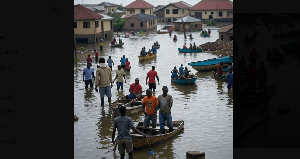The Lagos State Government has issued a critical warning to residents in flood-prone communities, urging them to immediately relocate to safer areas as heavy rainfall and widespread flooding continue to affect parts of the state.
Speaking on Channels Television’s Politics Today on Tuesday, August 5, the Commissioner for Environment and Water Resources, Tokunbo Wahab, emphasized that the alert followed updated forecasts indicating intensified rainfall and increased risk of life-threatening flood conditions in low-lying areas. Eyes Of Lagos reports,
“Those around the Ajilete axis of Lagos — that’s Ajegunle — they have to move,” Wahab said during the live interview.
“Those along the coastline in Ikorodu, such as Majidun, also need to move. Some parts of the Lekki corridor too — not all — are affected.”
The Commissioner also flagged Isheri (OPIC area) as another critical zone requiring high alert, advising residents to be proactive in evacuating until the situation improves.
In contrast, Wahab noted that Epe, Mushin, and Ikeja remain relatively safe for now, though he urged residents across the state to continue monitoring official updates and avoid complacency.
Torrential Rains and Submerged Streets
The warning comes in the aftermath of heavy downpours that began on Sunday night, August 3, and continued through Monday, August 4, causing serious disruption in several parts of Lagos. Viral videos on social media showed vehicles stranded, homes submerged, and major roads waterlogged, particularly in the Ajah, Lekki, and Ikorodu corridors.
The floods have paralyzed business activities and commuter movement, further compounding the struggles of residents already dealing with economic hardship and poor infrastructure.
According to Wahab, the ongoing crisis was not unexpected. The Nigerian Meteorological Agency (NiMet) had earlier projected that Lagos would experience heavier rainfall in 2024 compared to previous years, placing the coastal city at higher risk of seasonal flash floods.
“For those in the lowlands of Lagos, they must move to upland areas until the rain subsides,” Wahab advised.
Government Response and Infrastructure Plans
As part of mitigation efforts, Wahab explained that the Lagos State Government is expanding flood channels, clearing blocked drainages, and raising public awareness to curb the impact of the flooding.
“Lagos will be exposed to the vagaries of climate change, and that means flash flooding is inevitable,” Wahab said.
“But as a government, we must provide resilient infrastructure and urge our people to act responsibly.”
He acknowledged the limitations of government efforts in the face of extreme weather but reaffirmed the administration’s commitment to reducing flood damage and protecting both lives and property.
“We won’t lie to Lagosians,” Wahab added. “If nature takes its course, our job is to reduce the impact.”
He urged residents to cooperate with officials, heed evacuation orders, and report blocked drainages or unregulated building practices, which often contribute to flooding in urban areas.
Conclusion
As Lagos battles another wave of environmental distress, the government’s call to action highlights the urgency of climate adaptation and community cooperation. With the rainy season still ongoing, many hope that preventive relocation and ongoing infrastructure work will reduce the devastation typically associated with Lagos flooding.
General News of Wednesday, 6 August 2025
Source: www.eyesoflagos.com













